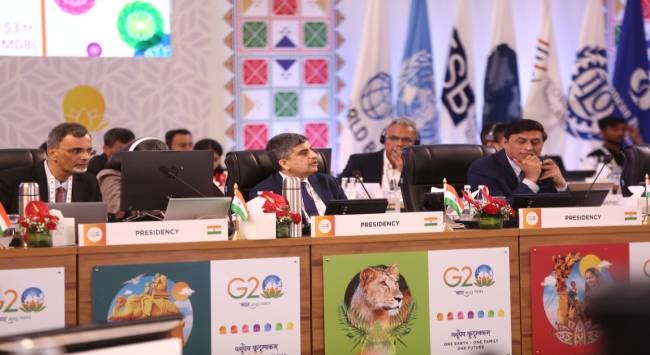Summary
Economic considerations are now driving India’s seemingly adroit steps in the foreign policy arena. Foreign policy has become a tool through which India is absorbing critical economic pressures and clinching and advancing emergent opportunities.
India sits atop global summits in 2023. From the presidency of the Group of Twenty (G20), stints as chair of the United Nations Security Council and the Global Partnership on Artificial Intelligence, rotating head of the Shanghai Cooperation Organization and participation at critical summits like the Group of Seven (G7), BRICS (Brazil, Russia, India, China and South Africa), Quadrilateral Security Dialogue (Quad) and the Association of Southeast Asian Nations, India’s 2023 diplomatic calendar looks stacked. Summits aside, India’s foreign policy agenda has widened with new partnerships forged, developed and consolidated to maximise the country’s path in a fractious international environment characterised by major power tensions, resource constraints, debt crises, and relentless digital disruptions.
Relations with the United States (US) appear to be on cruise control. Positive ties with Washington have propelled strategic partnerships with Japan and Australia, both Quad partners. Indeed, the Quad’s turn to address transnational issues like global health, climate change and digital issues gives New Delhi an opportunity to contribute to regional public goods in the Indo-Pacific.
Relations between the European Union (EU) and India have also been on the ascent, driven by a shared desire to enhance economic security. Importantly, dissonance with such major powers on Russia’s invasion of Ukraine has not dented or slowed their diplomatic prioritisation of India. New Delhi’s star remains undimmed. Despite entreaties to change tack, New Delhi has maintained stoic neutrality on Ukraine, refusing to publicly chastise Moscow. India’s Ukraine position continues to confound partners who rely on New Delhi to challenge and check China in the Indo-Pacific.
New Delhi has also pivoted to seize diplomatic opportunities in the Middle East, Latin America and Southeast Asia. Countries such as Israel, Egypt, the United Arab Emirates, Singapore and Brazil are forming partnerships with India to improve economic ties and help address regional challenges. Surprisingly, burgeoning convergence with the major and middle powers has not come at the expense of defending and backing the interests of the Global South countries. Indian officials are emphasising the concerns and interests of developing countries, particularly on economic issues, at regular multilateral summits, including the Conference of the Parties and World Bank meetings, and have pledged to centre their priorities through the country’s G20 presidency.
Countries worldwide are watching how India behaves abroad and what influences its seemingly nimble foreign policy that straddles different fora and relationships with elan. No doubt, Indian diplomacy’s moment is a recognition of its rise and growing economic and geopolitical stature. Yet, questions linger on what factors drive such seemingly adroit steps, manoeuvring in an international order that has become particularly gruelling for powers such as India that eschew tilting towards the US or China or US and Russia. What does this juncture reveal about India’s foreign policy? Is there a thread that connects India’s recent foreign policy positions?
Geographic and historical explanations cannot adequately explain the clinching of partnerships beyond the region with countries, particularly the Arab world, which have historically not had warm relations with Delhi. Blossoming relations with Europe and the US testify to the dynamism of India’s economic trajectory and future potential. New Delhi’s multilateral leadership and desire to use discussions at the G20 to highlight the plight of developing countries while ensuring the interests of the developed nations are not sacrificed and do not necessarily comport with incumbent capacities or capabilities. This multilateral disposition reveals India’s unique position within the international economy as a developing country that has interests which align with that of the developed world and has the ability to represent and advance those priorities in an international system riven with major power tensions and rivalries.
Economic considerations are chief, if not the most important, among the drivers of Indian foreign policy now. Economic considerations have affected three recent foreign policy matters: the Russia-Ukraine war and India’s response, the G20 presidency and US-India and EU-India relations. The prospects of adopting a geo-economic foreign policy have become more relevant and necessary as external shocks such as the pandemic, supply chain constraints, the Russia-Ukraine war, commodity hikes, inflation and competitive industrial policies arrived in 2020. Foreign policy, in effect, becomes a tool through which the Indian government absorbs critical economic pressures, clinches and advances emergent opportunities, and defends core interests through various economic instruments such as trade, technology and financing.
That said, the efficacy of a geo-economic foreign policy fundamentally hinges on how credibly India manages and sustains economic policy. Despite optimistic prognostications on the economy, difficulties in establishing and adhering to a predictable economic policy framework could dent the use of economic instruments to achieve foreign policy goals. Surveying recent Indian foreign policy issues, however, it is possible to discern the salience and likely impact of economic considerations relative to other factors such as identity, geography and history.
. . . . .
Dr Karthik Nachiappan is a Research Fellow at the Institute of South Asian Studies (ISAS), an autonomous research institute at the National University of Singapore (NUS). He can be contacted at isaskn@nus.edu.sg. The author bears full responsibility for the facts cited and opinions expressed in this paper.
Pic Credit : G20 India Twitter Account.
-
 More From :
More From :
-
 Tags :
Tags :
-
 Download PDF
Download PDF



